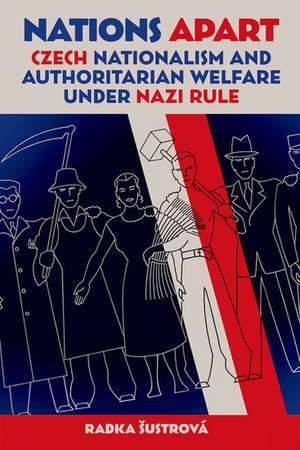Nations Apart: Czech Nationalism and Authoritarian Welfare under Nazi Rule: British Academy Monographs
Autor Radka ^D%Sustrováen Limba Engleză Hardback – 15 feb 2024
Din seria British Academy Monographs
- 27%
 Preț: 411.05 lei
Preț: 411.05 lei - 27%
 Preț: 471.54 lei
Preț: 471.54 lei - 25%
 Preț: 124.89 lei
Preț: 124.89 lei - 27%
 Preț: 501.53 lei
Preț: 501.53 lei - 22%
 Preț: 188.18 lei
Preț: 188.18 lei - 19%
 Preț: 678.05 lei
Preț: 678.05 lei - 28%
 Preț: 433.04 lei
Preț: 433.04 lei - 19%
 Preț: 627.73 lei
Preț: 627.73 lei - 27%
 Preț: 347.43 lei
Preț: 347.43 lei - 30%
 Preț: 648.07 lei
Preț: 648.07 lei - 19%
 Preț: 505.45 lei
Preț: 505.45 lei - 17%
 Preț: 543.30 lei
Preț: 543.30 lei - 30%
 Preț: 543.97 lei
Preț: 543.97 lei - 30%
 Preț: 541.61 lei
Preț: 541.61 lei - 30%
 Preț: 515.91 lei
Preț: 515.91 lei - 18%
 Preț: 321.69 lei
Preț: 321.69 lei - 30%
 Preț: 595.60 lei
Preț: 595.60 lei - 19%
 Preț: 589.20 lei
Preț: 589.20 lei - 19%
 Preț: 574.21 lei
Preț: 574.21 lei - 28%
 Preț: 376.01 lei
Preț: 376.01 lei - 28%
 Preț: 438.17 lei
Preț: 438.17 lei - 27%
 Preț: 501.93 lei
Preț: 501.93 lei - 29%
 Preț: 520.79 lei
Preț: 520.79 lei - 28%
 Preț: 469.25 lei
Preț: 469.25 lei - 27%
 Preț: 346.13 lei
Preț: 346.13 lei - 30%
 Preț: 544.80 lei
Preț: 544.80 lei - 31%
 Preț: 346.67 lei
Preț: 346.67 lei - 31%
 Preț: 468.15 lei
Preț: 468.15 lei - 28%
 Preț: 435.50 lei
Preț: 435.50 lei - 30%
 Preț: 602.11 lei
Preț: 602.11 lei - 30%
 Preț: 858.98 lei
Preț: 858.98 lei
Preț: 652.70 lei
Preț vechi: 930.81 lei
-30% Nou
Puncte Express: 979
Preț estimativ în valută:
124.91€ • 129.93$ • 103.12£
124.91€ • 129.93$ • 103.12£
Carte disponibilă
Livrare economică 13-19 martie
Preluare comenzi: 021 569.72.76
Specificații
ISBN-13: 9780197267639
ISBN-10: 0197267637
Pagini: 384
Ilustrații: 3 mono maps, 14 colour images
Dimensiuni: 160 x 240 x 25 mm
Greutate: 0.94 kg
Editura: OUP OXFORD
Colecția OUP Oxford
Seria British Academy Monographs
Locul publicării:Oxford, United Kingdom
ISBN-10: 0197267637
Pagini: 384
Ilustrații: 3 mono maps, 14 colour images
Dimensiuni: 160 x 240 x 25 mm
Greutate: 0.94 kg
Editura: OUP OXFORD
Colecția OUP Oxford
Seria British Academy Monographs
Locul publicării:Oxford, United Kingdom
Recenzii
This important work makes a major contribution to the history of the development of social welfare in mid-twentieth-century Europe. Through its careful analysis of the successive stages of Czech national, Nazi, and Communist welfare structures, it demonstrates the significant continuities of policies and of institutions that transcended the multiple changes of political regime in the Czech lands through the 1930s and 1940s. By doing so, %Sustrová's study demonstrates that the expansion of welfare systems of Europe, east and west, after 1945 was not the simple consequences of changes in political power. Instead, it was the product of the mid-century confluence of state ambitions, expert-led policies, and ideologies of social solidarity and of a national community.
%Sustrová rigorously challenges established truths about social policies during the Nazi occupation. Questioning the "resistancialist myth", she shows that while these policies were a racialist instrument of exclusion, they were also a tool for mobilizing and integrating the Czech populations. She argues that they encouraged the modernization of the Czech social policies paving the way for the universalist welfare state of the post-war era. We hope that this important and lucid book will inspire similar research in countries that have been occupied by the Nazis.
Czech workers were so integral to Germany's war economy that the Nazi state never contemplated deporting them eastward with other Slavs. Instead, that state took good care of their wages, benefits, and employment, with Czech officials helping at every step [...] Using sources unknown to western audiences Radka %Sustrová ponders the implications of her unsettling findings: was the occupation amoral collaboration, pragmatic professional cooperation, or an early and necessary stage of a modern welfare state, a prerequisite for today's democracy? In one of the most provocative and revealing books to appear on society and war for several decades, %Sustrová allows readers to judge for themselves.
%Sustrová rigorously challenges established truths about social policies during the Nazi occupation. Questioning the "resistancialist myth", she shows that while these policies were a racialist instrument of exclusion, they were also a tool for mobilizing and integrating the Czech populations. She argues that they encouraged the modernization of the Czech social policies paving the way for the universalist welfare state of the post-war era. We hope that this important and lucid book will inspire similar research in countries that have been occupied by the Nazis.
Czech workers were so integral to Germany's war economy that the Nazi state never contemplated deporting them eastward with other Slavs. Instead, that state took good care of their wages, benefits, and employment, with Czech officials helping at every step [...] Using sources unknown to western audiences Radka %Sustrová ponders the implications of her unsettling findings: was the occupation amoral collaboration, pragmatic professional cooperation, or an early and necessary stage of a modern welfare state, a prerequisite for today's democracy? In one of the most provocative and revealing books to appear on society and war for several decades, %Sustrová allows readers to judge for themselves.
Notă biografică
Radka %Sustrová is a lecturer in Social History at Charles University in Prague. She studied history and political science in Prague and Berlin. Her research focuses on the history of the welfare state, social justice, social and labour rights, women's activism, and nationalism in 20th-century central Europe. From 2020 to 2022, she was a British Academy Newton International Fellow and supervisor in history at the University of Cambridge. In 2022, she was awarded a Marie Sklodowska-Curie Fellowship at the University of Vienna. Her further publications include three books, several edited volumes, and articles in English, German, and Czech.
